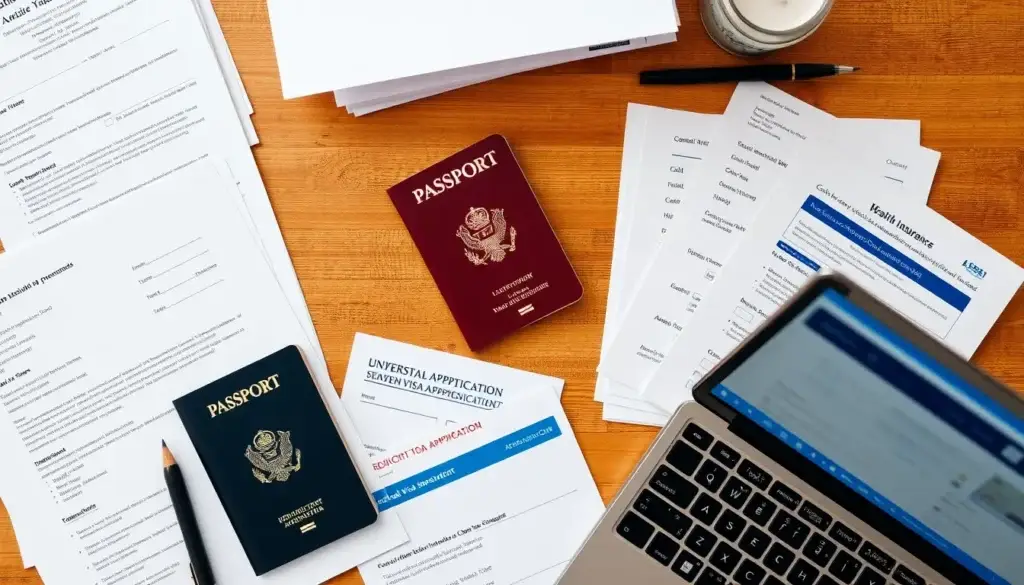Are you planning to study abroad? Getting a student visa is a huge step toward pursuing higher education internationally. Whether you are a future undergraduate, graduate student, or exchange student, knowing all about the process, requirements, and cost of the student visa application will save you time, stress, and money. This detailed guide will take you through all you need to know about the process to make it smooth and have you prepared for your next big academic adventure.
What is a Student Visa?

A student visa normally refers to the national permission that grants a person entry into another country for purposes of studying. Normally, it covers residence in the country during one’s academic years; however, this kind of visa usually has limitations on some working hours and also involves other restrictive conditions, such as course load or prohibition of certain activities.
For many, this is not merely an entry visa but an opportunity toward newer academic and cultural exposures. The requirements differ from country to country; hence, it’s always essential to find out what specific criteria the destination country relies on.
Types of Student Visas
Countries have devised student visas, which are broad and take different focuses depending on one’s chosen educational pathway. Below is a snapshot of the most in-demand student visas and their details.
F-1 Visa USA
The F-1 is a much sought-after visa by students for academic study in the US. It targets students who are enrolled in full-time academic courses at accredited US institutions. A student on an F-1 visa, upon completion of such a course, has the right to apply for Optional Practical Training for one year by working in his or her major field of study. Learn more about the F-1 Visa here.
Tier 4 Visa (UK)
The Student Route visa has replaced the now obsolete Tier 4 Student Visa for international students who plan to study in the United Kingdom. An applicant must receive an offer from a licensed higher education institution and establish finances to pay for tuition and maintenance living costs. Find more details about the Tier 4 Visa here.
Student Visa-Subclass 500 (Australia)
Australian Subclass 500 Visa: This visa is for students who want to study full-time at an Australian institution. It allows students to work on a part-time basis, that is, a maximum of 40 hours every fortnight, and generally allows specified family members, subject to meeting requirements. Check out more on Subclass 500 Visa.
Study Permit (Canada)
It allows students to study in various Designated Learning Institutions within the country. Students can work part-time during studies and full-time during break periods. Canada offers PGWP, where a student can work after studies. Find more information on Study Permits here.
Student Visa Application Process

It may seem complex, but breaking down the process into manageable steps makes it relatively easy. Here’s a general overview of the standard application process:
- Choosing Your Program and Institution
You will need to choose an accredited program and institution that you want to study at in your host country. You will also need to check if the institution will qualify for an international student under the host country’s visa program.
- School Admission
Almost all countries condition the issuance of a student visa with an admission letter from a high learning institution. You must obtain this letter before starting your application process.
- Document Preparation
Application Steps:
Gather all necessary documents for the application, including but not limited to:
- A passport
- Proof of finance, usually in the form of bank statements
- Health insurance if it is applied
- Transcript of your education history and Diplomas
- Proof of language proficiency test scores as may be required
- Visa Application Fee
Some nations charge variable student visa fees based on the country where one may want to study and possibly one’s type of visa. Most often, these registration fees are never refundable; thus, always confirm from the official immigration site of your destination country as to what amount the fee comes to.
- Scheduling and Attending the Visa Interview

It will also involve an interview in their visa application, in the case of some countries such as the United States. Do some research into common questions one may be asked and prepare responses.
- Waiting for the Visa Decision
After submitting your application and attending the interview, you’ll need to wait for processing, which varies by country. So, it’s best you get in touch with the embassy or consulate of the country where you have applied to get a rough estimate.
Common Requirements for Student Visas
Each country has its requirements concerning obtaining a student visa. Some of the general requirements that one may find in most of the popular destinations for studying include:
- Proof of Admission: Proof that the candidate received an admission letter from the accepted institution.
- Financial Documents: Bank statements or a letter from a sponsor explaining how you are able to pay tuition and living expenses.
- Passport: An effective passport that generally would convey a validity of at least six months beyond the intended end of your program.
- Photos: Passport-sized photos; the background and dimension requirements may vary.
- Health Insurance: Most countries require you to purchase health insurance that covers you for the length of your stay.
- Test Evidence of Your Proficiency in the Language: Some countries require tests like IELTS or TOEFL for confirmation of your language proficiency.
Tips for a Successful Student Visa Application

Application for a student visa is anything but hassle-free. Mentioned below are a couple of tips which might be helpful in getting success regarding your application:
- Apply Early: The processing time is different for every country, and sometimes even different types of visas are also processed through various time-consuming methods. So, apply pretty early.
- Be Honest and Consistent: The application cannot have any misrepresentation, and the information inside the application should be consistent with the supporting documents.
- Visa Interview Preparation: Be prepared to answer questions that may apply, in general, to your study plans, financial situation, and plans after graduation.
- Strong Ties to Your Home Country: Most countries want to know that students will return to their country of origin upon completion of studies.
- Clearly Stated Academic and Professional Goals: An academic and career plan is an indication of the seriousness of the applicant, a factor usually viewed favorably.
Student Visa Costs and Fees
The level of charges connected with student visas depends so much on the country of destination but also on the visa type. The following are the most common types of fees regarding a visa application:
- Application Fee: Paid at the time of lodging of a visa application.
- Visa Issuance Fee: Some extra money to be paid following the issuance of the visa.
- Health Insurance: Almost all countries require health insurance, though the fee differs with providers and coverage.
- Language Test Fee: Some countries require proof of language proficiency such as IELTS and TOEFL.
Comparative Table of Student Visa Requirements across Different Countries
| Requirement | USA (F-1 Visa) | UK (Tier 4 Visa) | Australia (Subclass 500) | Canada (Study Permit) |
|---|---|---|---|---|
| Acceptance Letter | Required | Required | Required | Required |
| Financial Proof | Required | Required | Required | Required |
| Health Insurance | Required (Optional for OPT) | Required | Required | Required |
| Language Requirement | Required (TOEFL or IELTS) | Required (IELTS) | Required (IELTS) | Required (IELTS) |
| Visa Interview | Required | Not required | Not required | Not required |
| Student Work Permit | Part-time only | Part-time only | Part-time only | Part-time only |
Frequently Asked Questions
Is one allowed to work on a student visa?
Most student visas allow the students to work part-time during term times and full-time during academic breaks. Working rules while studying vary by country, so it’s important to check the regulations for your study destination.
How long does a student visa last?
This will largely depend on the duration of your program plus a short grace period. Some countries allow an extension if one continues with studies.
Can I extend my student visa?
This is possible under certain conditions; for example, taking up another program. Remember to apply for your extension prior to the expiration date of your present visa for things to work smoothly.
What happens after I graduate?
Countries like Canada, the USA, and Australia offer post-graduation work permits for students to work after studies.
Do I need to provide health insurance?
Usually, yes. Health insurance is important because it covers you for any medical expenses while studying.
Can my family come with me?
Some have no restrictions and allow the family to stay with the international student. Usually, dependent visas are issued for such instances, though there are often restrictions imposed regarding work and duration.
Conclusion
Getting a student visa will be one of the biggest milestones for any student who dreams of going abroad. Through this process, it will be understood, and its requirements estimated for costs to make an application successful. One can always improve the chances with better preparation, early application, and plausible presentation of oneself.


